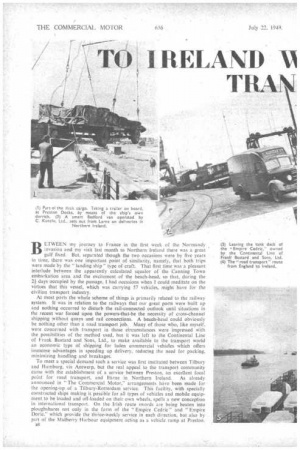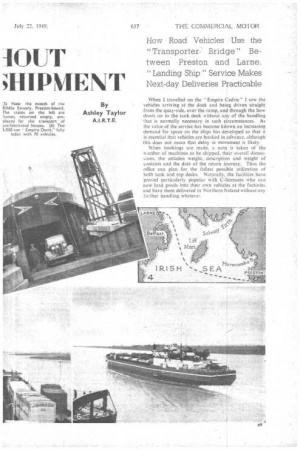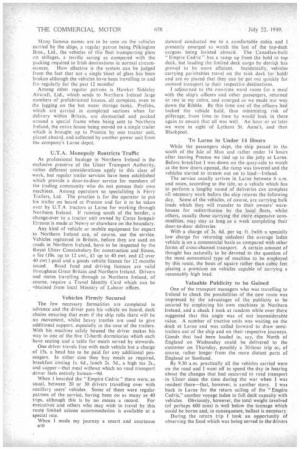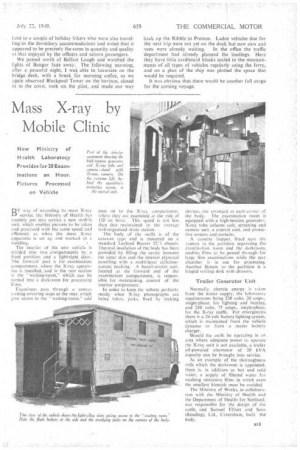TO IRELAND NI -10UT TRA\ ;HIPIVIENT
Page 16

Page 17

Page 18

Page 19

If you've noticed an error in this article please click here to report it so we can fix it.
By Ashley Taylor BETWEEN my journey to France in the first week of the Normandy . invasion and my visit last month to Northern Ireland there was a-great gulf fixed. But, separated though the two occasions were by five years in time, there was one important point of similarity, namely, that both trips were made by the "Landing ship" type of craft. That first time was a pleasant interlude between the apparently calculated squalor of the Canning Town embarkation area and the excitement of the beach-head, so that, during the 2i days occupied by the passage, I had occasions when I could meditate on the virtues that this vessel, which was carrying 57 vehicles, might have for the civilian transport industry.
At most ports the whole scheme of things is primarily related to the railway system. It was in relation to the railways that our great ports were built up and nothing occurred to disturb the rail-connected outlook until situations in the recent war forced upon the powers-that-be the necessity of cross-channel shipping without quays and rail connections. A beach-head could obviously be nothing other than a road transport job. Many of those who, like myself, were concerned with transport in those circumstances were impressed With the possibilities of the method used, but it was left to the Continental Line of Frank Bustard and Sons, Ltd., to make available to the transport world an economic type of shipping for laden commercial vehicles which offers immense advantages in speeding up delivery, reducing the need for packing, minimizing handling and breakages.
To meet a special demand such a service was first instituted between Tilbury and Hamburg, via Antwerp, but the real appeal to the transport community came with the establishment of a service between Preston, an excellent focal point for road transport, and Larne in Northern Ireland. As already announced in "The Commercial Motor," arrangements have been made for• the opening-up of a Tilbury-Rotterdam service. This facility, with specially constructed ships making it possible for all types of vehicles and mobile equipment to be loaded and off-loaded on their own wheels, spells a new conception in international transport. On the Irish route swords are being beaten into ploughshares not only in the form of the " Empire Cedric" and "Empire Doric," which provide the thrice-weekly service in each direction, but also by part of the Mulberry Harbour equipment acting as a vehicle ramp at Preston.
is8
When I travelled on the Empire Cedric" I saw the vehicles arriving at the dock and he* driven straight from the quay-side, over the ramp, and through the bow doors on to the tank deck without arty of the handling that is normally necessary in. such circumstanees. As the value of the service has become known an increasing demand for space on the Ships has developed so that it is essential that vehicles are booked in advance, although this does not mean that delay in moVernent is likely.
When bookings are made, a note is taken of the number of machines to be shipped, their overall dimensions, the unladen weight, description and weight of contents and the date of the return journey: Thus the office can plan for the fullest possible utilization of both tank and top decks. Naturally, the facilities have proved particularly popular with C-licensees who can now load goods into their own vehicles at the factories and have them delivered in Northern Tieland without any further handling whatever.
Many famous names are to be seen on the vehicles carried by the ships, a regular patron being Pilkington Bros., Ltd., the vehicles of this fleet transporting glass on stillages, a terrific saving as compared with the packing required to Irish destinations in normal circum stances. How effective is the system can be judged from the fact that not a single Sheet of glass has been broken although the vehicles have been travelling to and fro regularly for the past 12 months!
Among other regular patrons is Hawker Siddeley Aircraft, Ltd., which sends to Northern Ireland large numbers of prefabricated houses, all complete, even to the lagging on the hot water storage tanks. Prefabs, which are carried in completed sections when for delivery within Britain, are dismantled and packed around a special frame when being sent to Northern Ireland, the entire house being moved on a single trailer which is brought up to Preston by one tractor unit, placed aboard, and collected by another power unit from the company's Larne depot.
U.T.A. Monopoly Restricts Traffic
As professional haulage in Northern Ireland is the exclusive preserve of the Ulster Transport Authority, rather different considerations apply to ,this class of work, but regular trailer services have been established which provide a door-to-door service for members of the trading community who do not possess their own machines. Among operators so specializing is Ferry Trailers, Ltd. The practice is for the operator to put his trailer on board at Preston and for it to be taken over by U.T.A. tractors at Lame for working through Northern Ireland. If running south of the border, a change-over to a tractor unit owned by Coras lornpair Eireann is made at Newry or elsewhere on the boundary.
Any kind of vehicle or mobile equipment for export to Northern Ireland can, of course, use the service. Vehicles registered in Britain, before they are used on roads in Northern Ireland. have to be inspected by the Royal Ulster Constabulary for construction and fitness, a fee (10s. up to 12 cwt., El up to 40 cwt. and £2 over 40 cwt.) paid and a goods vehicle licence for 12 months issued. Road fund and driving licences are valid throughout Great Britain and Northern Ireland. Drivers and mates travelling through to Northern Ireland, of course, require a Travel Identity Card which can be obtained from local Ministry of Labour offices.
Vehicles Firmly Secured
The few necessary formalities are completed in advance and the driver puts his vehicle on board, deck chains ensuring that even if the ship rolls there will be no movement, whilst heavy trestles are used to give additional support, especially in the case of the trailers. With his machine safely housed the driver makes his way to one of the five 12-berth dormitories which each have seating and a table for meals served by stewards.
One driver travels free with each vehicle but a charge of 15s. a head has to be paid for any additional passengers. In either case they buy meals as required, breakfast costing Is. 6d., lunch 2s. 3d., a high tea 2s., and supper—that meal without which no road transport driver feels entirely human-9d.
When I boarded the "Empire Cedric" there were, as usual, between 20 or 30 drivers travelling over with ancillary users' vehicles. Some of them were regular patrons of the service, having been on as many as 40 trips, although this is by no means a record. For executives and others who may wish to travel by this route limited saloon accommodation is available at a special rate.
When I made my journey a smart and courteous steward conducted me to a comfortable cabin and I presently emerged to watch the last of the top-deck • cargoes being hoisted aboard. The Canadian-built " Empire Cedric" has a ramp up from the hold to top deck, but loading the limited deck cargo by derricA has proved to be more efficient. Incidentally, vehicles carrying perishables travel on the tank deck (or hold) and are so placed that they can be got out quickly for onward transport to their respective destinations.
I adjourned to the one-time ward room for a meal with the ship's officers and other passengers, returned to rest in my cabin, and emerged as we made our way down the Ribble. By this time one of the officers had locked the vehicle hold, thus minimizing risk of pilferage; from time to time he would look in there again to ensure that all was well. An hour or so later we were in sight -of Lytham St. Anne's, and then Black pool.
, To Larne in Under 14 Hours
While the passengers slept, the ship passed to the south of the Isle of Man and rather under 14 hours after leaving Preston we tied up to the jetty at Larne. Before breakfast I was down on the quay-side to watch as the bow doors opened, the ramp was lowered and the vehicles started to stream out on to land—Ireland.
The service usually arrives in Larne between 6 a.m. and noon, according to the tide, so a vehicle which has to perform a lengthy round of deliveries can complete all necessary work before the ship returns the following day. Some of the vehicles, of course, are carrying bulk loads which they will transfer to their owners' warehouses for redistribution by the local fleets, whilst others, usually those carrying the more expensive commodities, may stay as long as a week completing their door-to-door deliveries.
With a charge of 2s. 6d. per sq.. ft. (with a specially low charge for returning unladen) the average laden vehicle is on a commercial basis as compared with other forms of cross-channel transport. A certain amount of thought has naturally to be devoted to the question of the most economical type of machine to be employed by this route, the basis of square rather than cubic feet placing a premium on vehicles capable of carrying a reasonably high load.
Valuable Publicity to be Gained
One of the transport managers who was travelling to Ireland to check the possibilities of the new route was impressed by the advantages of the publicity to be secured by employing his own machines in Northern Ireland, and a check I took at random while over there suggested that this angle was of not inconsiderable value. A number of tractive units was waiting on the dock at Larne and was called forward to draw semitrailers out of the ship and on their respective journeys. Goods that had been loaded in, say, the North of England on Wednesday could be delivered to the customer on Thursday, possibly a 30-hour trip or, of course, rather longer from the more distant parts of England or Scotland.
By 9.30 a.m. practically all the vehicles carried were on the road and I went off to spend the day in hearing about the changes that had occurred to road transport in Ulster since the time during the war when I was resident there—that, however, is another story. I was back in Larne for the return sailing of the "Empire Cedric," another voyage laden to full deck capacity with vehicles. Obviously, however, the total weight involved (of perhaps 600 tons) is well below the tonnage which could be borne and, in consequence, ballast is necessary.
During, the return trip I took an opportunity of observing the food which was being served to the drivers
(and to a couple of holiday hikers who were also travelling qn the dormitory accommodation) and noted that it appeared to be precisely the-same in quantity and quality as that enjoyed by the officers and saloon passengers.
We passed north of Belfast Lough and watched the lights of Bangor fade away. The following morning, after a peaceful night, I wa* able to luxuriate on the bridge deck, with a break for morning coffee, as we again observed Blackpool Tower on the horizon, closed in to the coast, took on the pilot, and made our way
back up the Ribble to Preston. Laden vehicles due for the next trip were not yet on the dock but new cars and
vans were already waiting. In the office the traffic department had already planned the loadings. Here they have little cardboard blocks scaled to the measurements of all types of vehicles regularly using the ferry, and on a plan of the ship was plotted the space that would be required.
It was obvious that there would be another full cargo for the coming voyage.


























